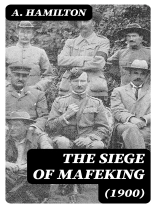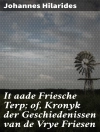In ‘The Siege of Mafeking, ‘ A. Hamilton masterfully chronicles the harrowing events surrounding the prolonged siege of the small South African town during the Second Boer War. Written in a gripping narrative style that combines firsthand accounts and detailed military analysis, the book immerses readers in the tense atmosphere experienced by the besieged inhabitants. Hamilton’s work sits within a broader literary context of war narratives from the late 19th century, reflecting the burgeoning interest in imperial conflicts and their impact on national identity, a theme that resonates throughout the text. A. Hamilton, having lived through the tumultuous period of the Boer War, offers a unique perspective shaped by personal experience and scholarly research. His position as a contemporary observer allows him to blend historical rigor with compelling storytelling, illuminating the complexities of colonial anxieties, heroism, and survival. His insightful reflections on the political and social dynamics of the era enhance the reader’s understanding of the broader implications of the siege within the context of the British Empire. This book is a crucial read for anyone interested in military history, colonial studies, or the intricacies of human resilience under pressure. Hamilton’s vivid portrayal of the Siege of Mafeking not only provides historical knowledge but also captivates with its emotional depth, making it an essential addition to the library of both scholars and general readers alike.
เกี่ยวกับผู้แต่ง
A. Hamilton remains a figure of minor historical interest in the domain of military history, particularly for the work ‘The Siege of Mafeking (1900)’. While details about Hamilton’s personal life and bibliography are not as extensively chronicled as those of more prominent authors, ‘The Siege of Mafeking’ endures as a testament to his literary endeavors. Providing a detailed account of the 217-day siege during the Second Boer War, Hamilton’s work is steeped in the narrative of British resilience and colonial military engagement. The prose, while indicative of the period’s imperialistic viewpoint, delivers a compelling and descriptive interpretation of the events that unfolded in the South African town of Mafeking. Despite the scarcity of comprehensive biographical information regarding Hamilton, his contribution to the historical account of this notable siege has found a place in the compendium of early 20th-century historical literature on the British Empire’s military exploits. His careful attention to the specifics of the siege and his ability to relate the human experiences within the broader military context reflect a narrative style that is both informative and engaging, offering valuable insight for scholars and enthusiasts of military history and colonial studies alike.












